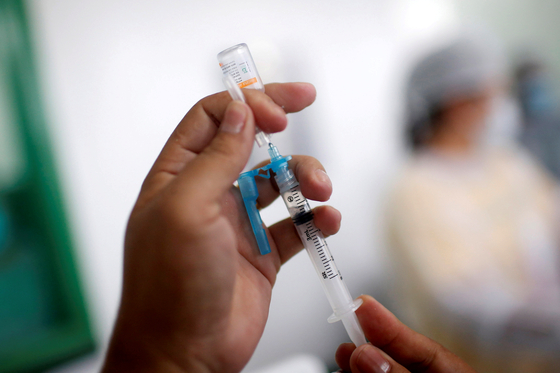The New York Times (NYT) reported on the 26th (local time) that China is facing a headwind after embracing’corona 19 vaccine diplomacy’. It is rather distrustful of opaque information, controversy about safety and efficacy, and delays in delivery.
![In January, at a hospital in Tabatinga, Amazonas, Brazil, medical staff are preparing an injection of the Chinese pharmaceutical company Sinobac's COVID-19 vaccine. [로이터=연합뉴스]](https://i0.wp.com/pds.joins.com/news/component/htmlphoto_mmdata/202101/27/be3b0b86-55fa-4efb-b39b-3408d1d092b6.jpg?w=560&ssl=1)
In January, at a hospital in Tabatinga, Amazonas, Brazil, medical staff are preparing an injection of the Chinese pharmaceutical company Sinobac’s COVID-19 vaccine. [로이터=연합뉴스]
Currently, at least 24 countries have purchased vaccines from China’s state-run pharmaceutical companies Sinoparm and Sinobac. When rich countries preoccupied Pfizer and Modena vaccine, China approached Asia, Africa, and the Middle East and proposed to export the vaccine. Those countries that could not obtain a vaccine from Western pharmaceutical companies were in a hurry and signed a contract with a Chinese pharmaceutical company. However, the problem was behind the scenes.
Jagged effect… Increased distrust in non-disclosure of information
It was a controversy about the efficacy that sparked distrust of Chinese vaccines. There are reports that the overall effectiveness of vaccines from Pfizer and Modena is inferior to those of Pfizer and Modena without sufficient information on the original development.
![Sinoparm's vaccine manufacturing plant, a Chinese state-run pharmaceutical company. [AP=연합뉴스]](https://i0.wp.com/pds.joins.com/news/component/htmlphoto_mmdata/202101/27/e369d6aa-fff6-4202-b7f1-f3de7a423361.jpg?w=560&ssl=1)
Sinoparm’s vaccine manufacturing plant, a Chinese state-run pharmaceutical company. [AP=연합뉴스]
In addition, reports of clinical trial results were jagged in each country, raising anxiety. In the case of the Synovac vaccine, the efficacy from 91% in a clinical trial in Turkey fell to 68% in Indonesia and 50% in Brazil. Synofam also showed 86% efficacy in the United Arab Emirates (UAE), but in its own clinical trial, it was lower with an average efficacy of 79%.
This resulted in confusion among vaccine purchasing countries. In the Philippines, criticism has arisen for the government hastily bought the vaccine without sufficient verification. Malaysia and Singapore have evolved dissatisfied public opinion, saying, “We will only approve the use of the vaccine if its safety and effectiveness have been verified.”
Delivery delay in Turkey and Brazil… China “Surge in Domestic Demand”
![Brazilian President Zaire Bolsonaro ridiculed the effectiveness of a Chinese vaccine that differs according to clinical results. [로이터=연합뉴스]](https://i0.wp.com/pds.joins.com/news/component/htmlphoto_mmdata/202101/27/c48da032-1d31-4436-91b6-7e944f4ed2a9.jpg?w=560&ssl=1)
Brazilian President Zaire Bolsonaro ridiculed the effectiveness of a Chinese vaccine that differs according to clinical results. [로이터=연합뉴스]
Dont even get the vaccine on time. Turkey and Brazil are disrupting vaccination schedules as vaccines and ingredients are delayed in China.
The Turkish government decided to receive 10 million doses of the Synovac vaccine by December last year, but only 3 million doses were secured by the beginning of this month. Brazil is the same as tease. It was decided to manufacture a vaccine at its own factory after receiving the raw materials, but it is still no news. Brazil’s Health Minister Eduardo Pazuelo complained of frustration, saying, “China is looking to process documents for the export of vaccine raw materials.” Ultimately, Brazil recently bought 2 million doses of the AstraZeneca vaccine produced in India.
![On the 25th, Sinobac's COVID-19 vaccine from China arrived at Istanbul Airport, Turkey. [AP=연합뉴스]](https://i0.wp.com/pds.joins.com/news/component/htmlphoto_mmdata/202101/27/0df16614-e770-4178-96c3-13d54ab48d15.jpg?w=560&ssl=1)
On the 25th, Sinobac’s COVID-19 vaccine from China arrived at Istanbul Airport, Turkey. [AP=연합뉴스]
Earlier, China was confident it could produce up to 2 billion doses of vaccine this year. But recently, the position has changed. In a statement, the Chinese Ministry of Foreign Affairs said, “China also needs a lot of vaccines,” and said, “We are trying to fulfill our export contracts while meeting domestic demand.”
Reporter Lee Min-jung [email protected]
